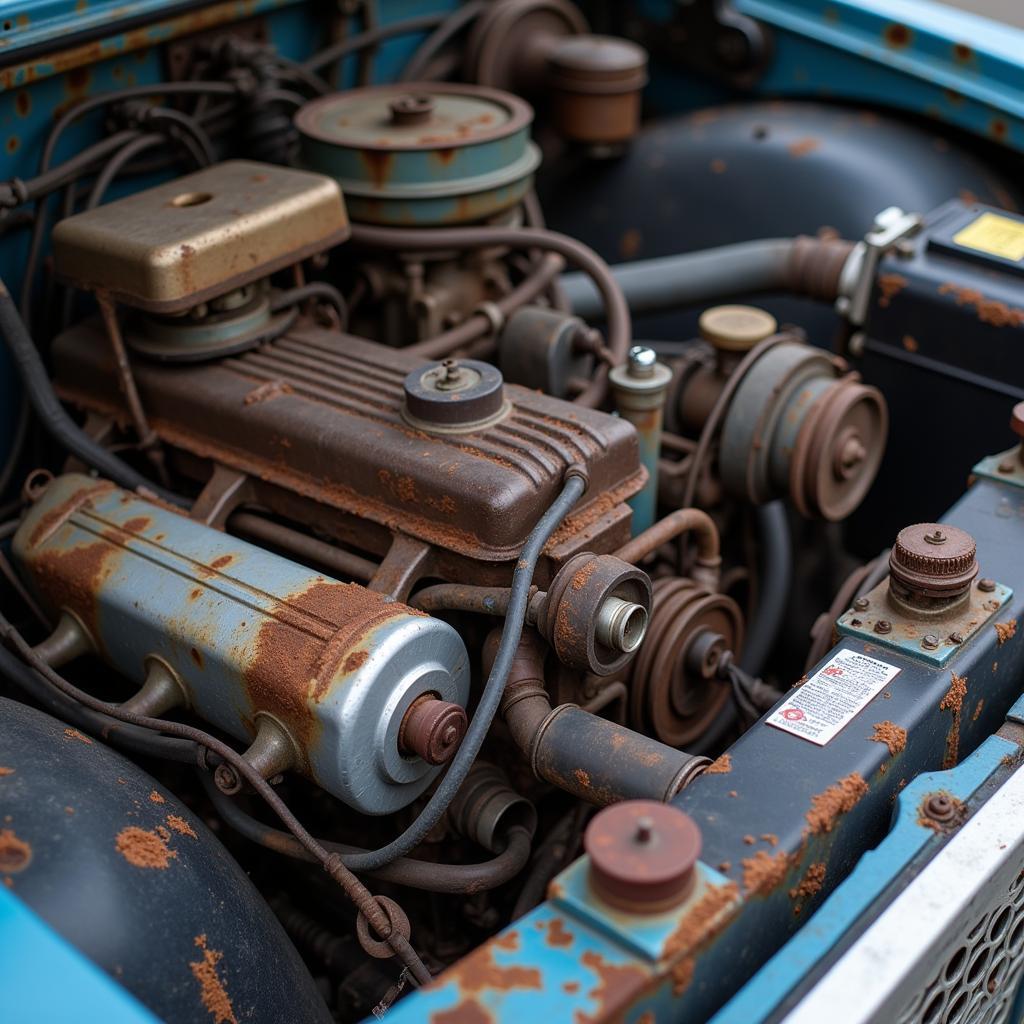The sweltering heat of summer can make driving unbearable without a functioning car AC. But before you rush to a mechanic, there are several troubleshooting steps and even fixes you can perform yourself to get that cool air flowing again. This comprehensive guide will walk you through the common reasons your car AC might be on the fritz and provide practical solutions to get you back on the road in comfort.
Understanding Your Car’s AC System
Before you start diagnosing your AC woes, it’s helpful to have a basic grasp of how the system works. Essentially, your car AC operates like a refrigerator, utilizing refrigerant to absorb heat and create cool air.
Here’s a simplified breakdown:
- Compressor: This component compresses the refrigerant gas, raising its temperature.
- Condenser: Hot, pressurized refrigerant travels to the condenser (located at the front of your car), where it’s cooled by airflow, turning it into a liquid.
- Receiver/Drier: This unit stores the liquid refrigerant and removes any moisture.
- Expansion Valve: This valve regulates the flow of refrigerant into the evaporator.
- Evaporator: As the refrigerant evaporates in this component (located inside the dashboard), it absorbs heat from the surrounding air.
- Blower Motor: The blower motor forces the cooled air through your car’s vents.
Common Car AC Problems and Solutions
A malfunction in any part of the AC system can lead to warm air blowing from your vents. Here are some of the most common culprits and how to address them:
1. Low Refrigerant Level
Problem: Insufficient refrigerant is a leading cause of poor AC performance. A leak in the system is the usual suspect, leading to a gradual loss of refrigerant over time.
Solution: If you suspect a leak, it’s crucial to have a professional AC technician locate and repair it. They will then evacuate the system and recharge it with the correct type and amount of refrigerant.
Tip: Avoid adding refrigerant yourself without properly identifying and fixing a leak, as this can be ineffective and potentially harmful.
2. Electrical Issues
Problem: The AC system relies on various electrical components, including fuses, relays, and wiring. A blown fuse, faulty relay, or damaged wiring can disrupt the flow of electricity, preventing the system from operating.
Solution: Consult your car’s owner’s manual to locate the AC-related fuses and relays. Inspect them for any signs of damage or burning. Replace any blown fuses or faulty relays with ones that have the correct amperage rating. If you suspect wiring issues, consult a qualified mechanic for diagnosis and repair.
3. Blower Motor Failure
Problem: If you hear unusual noises from your vents, or there’s little to no airflow even when the AC is turned on, the blower motor might be failing.
Solution: First, check the blower motor resistor, as this component can often fail before the motor itself. If the resistor is functioning, then the blower motor likely needs replacement. This repair can be complex and is best left to a professional.
4. Condenser Problems
Problem: As the condenser is located at the front of your vehicle, it’s susceptible to damage from road debris, insects, and dirt buildup. A dirty or damaged condenser cannot efficiently cool the refrigerant.
Solution: Regularly inspect your condenser for any signs of damage, such as bent fins or leaks. You can carefully clean the condenser fins using a soft brush or compressed air. For significant damage, replacement might be necessary.
5. Faulty Compressor
Problem: The compressor is the heart of the AC system. If it’s failing, you might notice loud noises, inconsistent cooling, or no cooling at all.
Solution: Due to the complexity of the compressor, it’s best to consult a mechanic for diagnosis. Repairing or replacing a compressor can be costly, so getting a professional opinion is essential.
Preventing Future AC Problems
Taking proactive steps to maintain your car’s AC system can prevent many issues and prolong its lifespan:
- Regular Servicing: Have your car’s AC system inspected and serviced annually by a qualified technician, preferably in the spring before the hot weather hits.
- Keep it Running: Running your AC for at least 10 minutes every couple of weeks, even during the colder months, helps keep the refrigerant circulating and prevents seals from drying out.
- Cleanliness Counts: Regularly cleaning your car’s cabin air filter and ensuring good airflow around the condenser can prevent dust and debris from hindering the system’s performance.
When to Seek Professional Help
While some AC issues can be resolved with DIY fixes, it’s important to recognize when professional help is necessary. Consider seeking assistance from a qualified mechanic if:
- You’ve tried troubleshooting but the problem persists.
- You suspect a refrigerant leak.
- The issue involves electrical components or the compressor.
- You’re not comfortable working on your car’s AC system.
Do you need help getting your car AC back in tip-top shape? The expert technicians at AutoTipPro are here to assist! We specialize in diagnosing and repairing all types of car AC issues, ensuring you stay cool and comfortable on the road. Contact us at +1 (641) 206-8880 or visit our office at 500 N St Mary’s St, San Antonio, TX 78205, United States.
FAQs about Car AC Repair
1. How much does it cost to fix a car AC?
The cost of car AC repair varies greatly depending on the problem, car make and model, and labor rates. Minor repairs like fuse replacements can be relatively inexpensive, while major repairs like compressor replacements can cost significantly more. Get ac fixed in car to learn more about the cost.
2. How often should I recharge my car AC?
A properly functioning car AC system should not require frequent recharging. If your AC needs recharging every year or more frequently, there’s likely a leak that needs to be addressed.
3. Can I add refrigerant to my car AC myself?
While DIY refrigerant recharge kits are available, it’s generally not recommended unless you have the proper knowledge and equipment. Incorrect handling of refrigerant can be dangerous and potentially damage your AC system. It is best advised to find mechanics that fix ac in cars near you to help you out.
4. How do I know if my car AC needs refrigerant?
Signs of low refrigerant include weak airflow from the vents, warm air blowing instead of cold air, and a hissing sound coming from the AC system.
5. Can I fix my car AC if it’s leaking water?
Water leaking from your car is normal and indicates that the AC system is removing humidity from the air. However, excessive water leaking inside the car might indicate a clogged drain tube, which needs to be cleared. Learn how to fix AC water leak in car.
6. What is that bad smell coming from my car AC?
A musty or unpleasant odor coming from your AC vents usually indicates mold or mildew growth on the evaporator. This can be remedied by having the system cleaned and disinfected by a professional.
7. How can I fix my car AC if it’s not blowing cold air?
Start by checking the basics, such as ensuring the AC is turned on, the fan speed is set correctly, and the temperature is set to cold. If these are fine, then further troubleshooting, as outlined in this guide, is necessary. If you are looking to fix AC in your car at Walmart, that may not be possible.






Leave a Reply